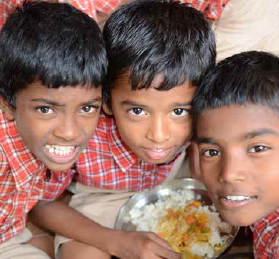
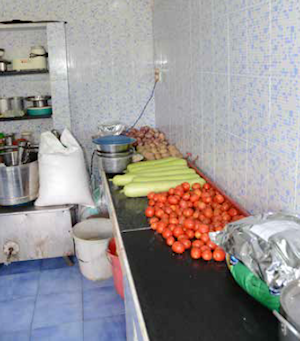
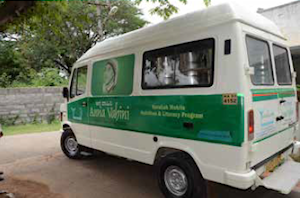
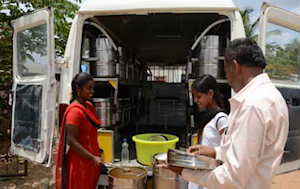
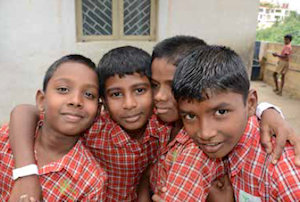
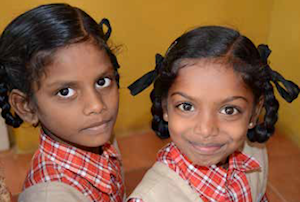
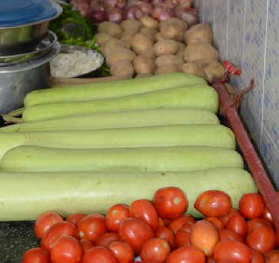
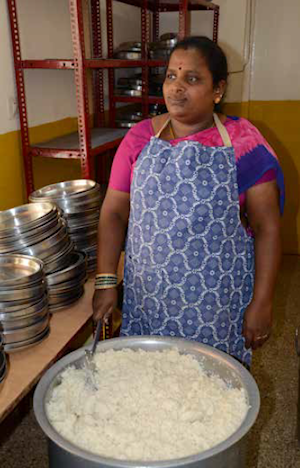
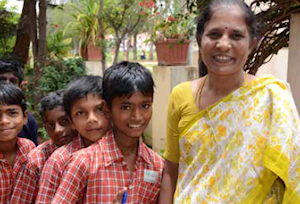
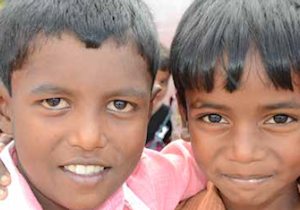
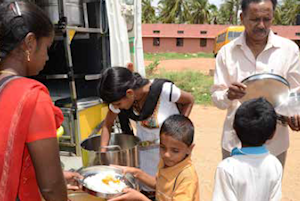
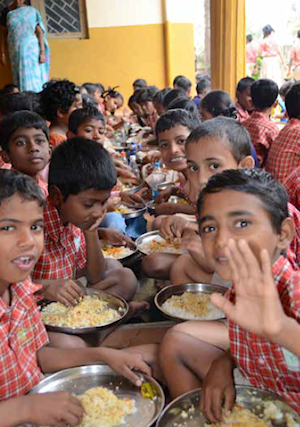
Feeding Impoverished School Children in Bangalore
Mother Teresa Children's Foundation supports the Anna Vahini feeding and Nutrition program in Bangalore, Karnataka State, India. MTCF provides monthly support for the cost of feeding approximately 625 children twice each day. The annual food budget is in excess of $300,000 USD.
"Anna Vahini" is Sanskrit, an ancient language still used in India today. Anna means "food" and Vahini translates into "carrier." It is written on the side of the large van, purchased by Mother Teresa Children's Foundation, that transports nutritious meals to children each day who live in slum areas around the Bangalore area in southern India.
Each day, buses drive into four main slum areas and pick up children who live in Baglur, Lingarajpura, Djhalli and Periyar Nagal. These children have been selected for this program because they are the "poorest of the poor."
About 475 children, ages six to sixteen, eat together twice a day at the main facility and then attend school in the nearby education facility, the Rhia community school.
Another 150 younger children, as young as three years old, are fed in a separate facility about six kilometers away. The Anna Vahini food van transports and serves the meals prepared in the main kitchen to the younger children at the satellite location. According to staff, when the children first come into the program, they are so malnourished, it seems there is no hope. However, within three months of regular, nutritious meals, the transformation is apparent.
The MTCF Anna Vahini nutrition program starts each morning with a highly nutritious nine-grain porridge and milk. When the MTCF supported feeding program was initiated, it did not include breakfast, only a mid-day meal. "One day when we had a doctor on site, he commented on the children's inability to pay attention in class. They were drooping and lethargic," said Rajshekhar. "It wasn't that the children weren't interested, they were just hungry."
"Now we can give them a proper breakfast," said Dr. Sajan George Kavinkalath, president of MTCF. He added that the porridge mix is filled with vitamins, like calcium and iron and also very high in protein.
"Serving breakfast has eliminated the iron deficiencies and hunger that created the lethargy and short attention span," he said. A dietician manages the menu to assure the proper foods are included in the correct quantities. For lunch the children receive things like rice, vegetables and gravy. The menu calls for variety and adds in carrots, beans, potatoes, eggplant and spinach.
Project Achievements
The nutritious meals have created higher functioning children in the classroom. "From 2007 to present, we have seen drastic changes," said Rajshekhar. "Children are alert and attentive, performing at higher levels and doing well in their studies."
The overall health of the children has also improved. Previously, if one child had a fever, cold, cough or flu, it would spread like wild fire. Every child would come down with illness because resistance was so low among all the children. Because of the consistent high nutrition meals, illness has now decreased to the point where the facility no longer needs to retain a nurse on site. Hospitalizations for serious illness have also declined.
The MTCF nutrition and education program also teaches hygiene practices, such as hand washing and cleanliness. This has also had a positive impact on their health and well-being. The children also take the hygiene habits they learn at school home with them, where they positively impact parents and other siblings.
Additional project achievements include the renovation of the kitchen. Before the renovation, the space was very small. Now, it is expanded and reorganized. The overall kitchen and preparation area is very clean and hygienic. Rather than wood burning ovens, the kitchen now operates efficiently with full steam boilers.
The commercial sized cooking areas accommodate large pots for porridge that require two people to carry them. The entire kitchen was customized to fit the needs of the program and space requirements. In addition to the construction remodel and outfitting the kitchen with the cooking appliances, MTCF also funded accessory items like pots, pans, utensils and lunch trays for the children.
Some Testimonials
Kavya, age nine, joined the school and feeding program in June of 2012. She lives in a nearby slum area. She is an orphan, but fortunately, some neighbors stepped in and agreed to be her guardian. The program has given her hope for the future. "First, we need to fill her stomach. Then we can educate her and prepare her to face life," said a program leader.
Samira, age 16, lives in Babusapalaya Village and attends school daily. She receives both porridge for breakfast and a nutritious lunch. Her parents, like many children in the MTCF supported program, are illiterate and were unable to fill out the necessary forms for Samira's admission. Her father works as an unskilled laborer and earns the equivalent of about $100 USD per month. She is deeply grateful for the chance to eat twice each day and to attend school.
Many beneficiaries of the program live with just one parent, in the surrounding slum areas. Their parents perform hard labor at a nearby rock quarry where they crush rocks by hand, used for roads and foundations. They earn about $2 USD per day. Because of their low caste, they are stigmatized and ostracized by society and have no other job options. "The caste system here in India is unfair and unjust. The less privileged are treated very poorly by society," said a program leader. "The children and their parents believe that because they were born at the bottom of the caste system, it is their lot in life and their destiny."
Thanks to the MTCF funded program, these children have a chance in life. "We give hope. It doesn't matter where the children come from. We feed them. We teach them that they can become someone in life. If we persist, if we are patient, we will continue to see results. By feeding and educating, we will transform the whole face of India," said Mother Teresa Children's Foundation president Dr. Sajan George Kavinkalath.